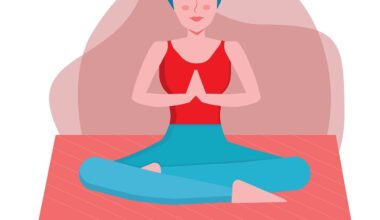The Connection Between Sleep, Stress Management, and Athletic Recovery
Understanding the intricate relationship between sleep, stress management, and athletic recovery is vital for athletes and active individuals. Sleep plays a critical role in managing stress levels, enabling better performance and recovery after intense workouts. When athletes prioritize quality sleep, they enhance their body’s ability to recover from stressors associated with training, competition, and daily life. Adequate rest can improve cognitive functions, such as decision-making and focus, which are essential during athletic performance. Research shows that sleep deprivation can lead to increased stress and a decrease in physical performance, making it crucial for athletes to develop effective sleep hygiene routines. Stress management techniques, such as meditation, yoga, or deep breathing, can further enhance the quality of sleep. Incorporating such practices into daily routines can help alleviate the mental load experienced by athletes. By prioritizing sleep and implementing stress relief strategies, athletes improve not only their recovery but also their overall athletic performance. A comprehensive approach that encompasses these elements can lead to longer and healthier athletic careers. Ensuring restful sleep should be a non-negotiable part of any athlete’s training strategy for success.
Sleep is often overlooked in athletic training, but its impact on stress and recovery is undeniable. Many athletes focus exclusively on physical training, neglecting the significance of sleep quality and duration. Sleep deprivation not only affects physiological recovery but can also lead to psychological stress, impeding focus and motivation. The body repairs itself during deep sleep, producing hormones essential for muscle growth and recovery. To combat stress and enhance recovery, athletes must establish a consistent sleep schedule, ensuring adequate rest before major competitions and training. Prioritizing sleep hygiene practices, such as creating a dark, cool, and quiet bedroom environment, can help improve sleep quality. Moreover, athletes should be mindful of their pre-sleep activities, avoiding screens and stimulating substances like caffeine. Incorporating relaxation techniques, such as reading or taking a warm bath, can signal the body that it’s time to wind down. In addition to these practices, tracking sleep patterns using apps or wearable devices might provide valuable insights on improvements. Investing in sleep is as important as physical training, especially when aiming for peak performance. Ultimately, achieving the perfect balance between rest, stress management, and physical exertion can lead to substantial benefits in athletic outcomes.
Stress management is equally essential for athletes as it profoundly influences their performance and mental well-being. Managing stress effectively can minimize its negative impacts while also allowing athletes to maintain focus during competitions. Techniques for stress management can vary widely, from mindfulness practices to structured training periods and rest days. Mindfulness meditation has been shown to reduce anxiety and improve overall emotional regulation, providing athletes with tools to cope with competitive pressures and stressors. Emphasizing the importance of mental recovery alongside physical recovery is critical. Many athletes implement visualization techniques to mentally rehearse and prepare for their performances, thereby reducing anxiety levels significantly. Additionally, engaging in supportive social networks can alleviate feelings of isolation often experienced in high-pressure situations. Training with teammates can foster camaraderie, which provides psychological support that enhances performance outcomes. Regularly evaluating stress levels and employing effective coping strategies can lead to better focus and resilience in challenging situations. An athlete’s performance can vastly improve when they take an active approach towards managing both stress and sleep, forming a foundation for their overall success and health.
Nutrition also plays a crucial role in enhancing sleep quality, directly affecting stress levels and recovery. A well-balanced diet rich in nutrients supports bodily functions and can improve sleep efficiency. Consuming foods easy to digest and rich in vitamins and minerals like magnesium, potassium, and calcium can positively influence sleep and recovery. Athletes should consider timing their meals around their training schedule, thus optimizing energy levels and reducing nighttime digestive discomfort. Foods that promote serotonin production, such as bananas, can elevate mood and facilitate relaxation. Likewise, avoiding heavy meals close to bedtime ensures uninterrupted sleep cycles. Staying hydrated throughout the day is essential; however, it’s wise to moderate fluid intake right before sleep to minimize disturbances. The cumulative effects of a nutritionally sound diet extend beyond immediate recovery, influencing an athlete’s long-term health, energy levels, and overall performance. Monitoring dietary habits, both for macronutrients and micronutrients, can help athletes adjust their intake based on their training demands. Hence, nutrition should be a foundational component that supports both stress management and quality of sleep in a recovery-focused athletic lifestyle.
The Power of Sleep and Its Influence on Performance
The quality of sleep directly influences athletic performance, with profound implications for stamina, power, and agility. Sleep is the body’s natural recovery tool, allowing athletes to recharge in preparation for upcoming physical challenges and competitions. A solid night’s sleep can enhance reaction times, speed, and output during training sessions. Conversely, sleep disturbances can lead to fatigue, hampering both physical and cognitive abilities crucial during competitions. Consistent sleep patterns are vital; irregular sleep can disrupt the body’s internal clock, leading to decreased operational efficiency. Athletes should seek to consistently achieve the recommended seven to nine hours of quality sleep per night based on their specific needs, maintaining a routine even during travel for competitions. Emphasizing the role of sleep can dramatically affect training outcomes, recovery, and stress relief, forming an undeniable link between sleep and athletic success. Athletes should view sleep as a critical part of their training regimen, establishing a strong framework for ongoing performance advancements. Prioritizing rest as part of a holistic training program can leave athletes feeling renewed, allowing them to tackle challenges head-on while managing stress effectively, thus improving their overall performance.
Furthermore, innovative tools such as sleep trackers and recovery apps allow athletes to monitor their sleep patterns closely. These technologies provide feedback on sleep duration and quality, helping athletes make informed decisions about their recovery routines. Using this data, athletes can identify trends and areas for improvement related to their rest and recovery. Additionally, these advancements can encourage athletes to adopt better sleep habits while being held accountable for their recovery processes. Educating athletes on the significance of both sleep and stress management, coupled with technology’s support, cultivates resilience and enhanced performance. Athletes who engage with these tools are often more proactive in prioritizing their well-being. By sharing recovery strategies, teams can foster a culture centered on the necessity of adequate sleep and stress management practices. This communal focus can ultimately lead to improved team dynamics and group performance. Ultimately, incorporating sleep technology into training regimens can bridge the gap between understanding recovery and effectively applying techniques that promote optimal performance during competitive settings. The interplay between technology, sleep, and recovery paves the way for targeted strategies that build resilience in athletes.
Creating effective routines that integrate sleep, dietary choices, and stress management techniques fosters a holistic approach to athletic recovery. Establishing a routine can have significant long-term benefits, emphasizing the importance of consistency in athlete practices. Knowing when to rest and when to push through is crucial for peak performance. Athletes can schedule training, meal times, and sleep to maximize recovery while effectively managing stress levels. Cross-training and incorporating low-impact workouts on rest days maintain fitness levels while allowing the body to recuperate. Sticking to recovery schedules minimizes fatigue, making athletes more resilient to stress and enhancing overall performance. Maintaining open communication with coaching staff about stressors and sleep challenges allows for tailored approaches to individual needs, supporting psychological well-being alongside physical health. Additionally, sharing insights with teammates fosters a cooperative environment focused on mental and physical fitness. As athletes strive for excellence, they must consider these interconnected strategies to navigate pressures effectively. Committing to these well-rounded approaches can ensure athletes unlock their full potential while significantly improving their recovery processes and performance under stress.
Conclusion: The Holistic Approach to Athletic Recovery
In conclusion, sleep, stress management, and nutrition form a triad essential for optimal athletic recovery. By prioritizing sleep and harnessing techniques to manage stress effectively, athletes can enhance their performance levels. Understanding the unified nature of these elements aids athletes in developing holistic strategies that empower their training routines. Continuous education on the significance of sleep and stress relief is vital for creating a culture that values recovery. Therefore, athletes must incorporate mindful schedules, adapting practices like meditation or nutrition plans, to ensure comprehensive wellness. Seeking guidance through technology tools can further assist athletes in refining their approaches. As the link between these elements becomes clearer, so does the path to better performance outcomes emerge. In striving for athletic success, individuals must acknowledge the importance of well-rounded recovery mechanisms to elevate both physical and mental conditioning. Committing to practices that support deep, restorative sleep, alongside effective stress strategies, ultimately enables athletes to thrive in all aspects of their sport.


